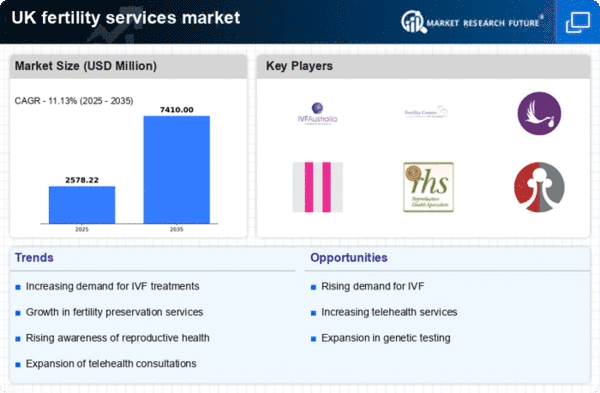Changing Societal Norms
Shifts in societal norms regarding family planning and childbearing are influencing the fertility services market in the UK. More individuals are prioritizing career development and personal goals before starting families, leading to delayed parenthood. This trend has resulted in a higher demand for fertility services, as older parents may face increased challenges in conceiving. Data suggests that the average age of first-time mothers has risen to 30.7 years, which may contribute to a growing reliance on assisted reproductive technologies. The fertility services market is adapting to these changes, offering tailored solutions that cater to the evolving needs of prospective parents.
Rising Infertility Rates
The fertility services market in the UK is experiencing growth due to rising infertility rates among couples. Recent data indicates that approximately 1 in 7 couples face difficulties conceiving, which translates to around 3.5 million people affected. This trend is likely to drive demand for fertility services, as individuals seek medical assistance to overcome reproductive challenges. Factors contributing to infertility include lifestyle choices, delayed parenthood, and medical conditions. As awareness of these issues increases, more couples are turning to fertility clinics for support, thereby expanding the market. The fertility services market is poised to benefit from this growing need, as healthcare providers enhance their offerings to cater to a larger demographic seeking assistance with conception.
Increased Awareness and Education
The fertility services market in the UK is benefiting from increased awareness and education surrounding reproductive health. Public discussions and educational programs are helping to destigmatize infertility, encouraging individuals to seek help sooner. Surveys indicate that nearly 60% of the population is now aware of available fertility treatments, a significant increase from previous years. This heightened awareness is likely to lead to greater utilization of fertility services, as more people understand their options. The fertility services market is thus positioned for growth, as educational initiatives continue to empower individuals to take charge of their reproductive health.
Government Initiatives and Funding
Government initiatives aimed at improving reproductive health are playing a crucial role in the fertility services market in the UK. The National Health Service (NHS) has been increasing funding for fertility treatments, with reports indicating that over £200 million is allocated annually to support assisted reproductive technologies. This financial backing not only makes treatments more accessible but also encourages clinics to expand their services. Furthermore, public health campaigns aimed at educating the population about fertility issues are likely to increase awareness and utilization of available services. As a result, the fertility services market is expected to grow, driven by enhanced public support and funding for reproductive health services.
Advancements in Reproductive Technologies
Innovations in reproductive technologies are significantly impacting the fertility services market in the UK. Techniques such as in vitro fertilization (IVF), preimplantation genetic testing (PGT), and cryopreservation are becoming more sophisticated and widely available. The market for IVF alone is projected to reach £1.5 billion by 2026, reflecting a growing acceptance and reliance on these advanced methods. As technology continues to evolve, clinics are likely to offer more effective and efficient treatments, attracting a broader clientele. The fertility services market is thus positioned to thrive, as patients increasingly seek out cutting-edge solutions to their fertility challenges.
















